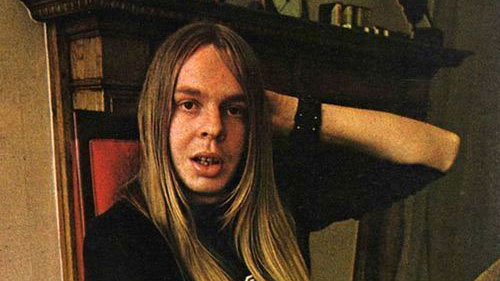Electronic Music Interviews

Rick Wakeman
Via Email with Paul Clark, September 2002
Richard Christopher "Rick" Wakeman (born 18 May 1949) is an English keyboardist, songwriter, television and radio presenter, author, and actor. He is best known for being in the progressive rock band Yes across five tenures between 1971 and 2004 and for his solo albums (from Wikipedia)
About thirty years ago I saw you on a British TV show called Runaround promoting your latest album, and I got to see and hear my first synthesizer. Little did I know at the time that those few moments would change my life, to such an extent that I now live in Seattle and own electronicmusic.com.
How aware are you of your influences on people, past and present, both as a solo musician and also as a member of Yes?
I suppose in recent years I have started to realise that perhaps I have had some small influence in helping people achieve their own musical goals and it's actually a nice feeling to know that perhaps some extra sunshine has been brought into lives because of this.
It's very difficult to see yourself as others see you and so it's almost embarrassing when people are kind enough to say nice things about your music and how it has perhaps influenced them into starting to play, or playing more.
What were the circumstances surrounding your introduction to the Moog synthesizer?
I saw my first moog in a studio in London in the late sixties. It was a wonderful monster and I immediately fell in love with it and the phenomenal sounds it made.
Did you ever give feedback or suggestions to Robert Moog directly?
That would be like telling the late Dr. Christian Barnard which scalpel to use in a heart transplant! Dr. Moog and I are great friends and I would like to think that I perhaps helped with some of the troubleshooting in the early days. He is the genius though!
As a prolific session musician in the 70's you must have been involved in numerous projects that went on to become legendary, can you talk about one or two and give insights into how they went?
These are well documented and I suppose the best known from way back then was my work with David Bowie on Hunky Dory and Space Oddity. Morning Has Broken with Cat Stevens is another that springs to mind. There were so many and they were all over in a few hours so it's pretty difficult to assess them so many years ahead. I was lucky to work with some great people though and it really helped shape my future. David Bowie was a joy to work with.
Who's idea was it to wear a silver cape on stage, and other than the sheer showmanship of it why a cape?
It came about because an early revue said that I played well but looked like a demented spider with legs and arms stretching everywhere. Yes were playing Hartford, Connecticut, and a local DJ introduced us. He was wearing a cape. I looked at it and realised that that was the answer to my dreams. As he walked off and we walked on I offered him my week's wages ($200) for it. After a bit of haggling he sold it to me. I put it on and walked on stage.
I still have it. I also have four or five other capes still. Many of the rest were auctioned for charity.
Was the ability to play as many different keyboards at the same time a skill that came naturally to you or did you have to work at it?
It came naturally out of necessity I suppose. I've never really thought about it. I mostly play with my eyes closed so it really doesn't matter anyway!!!
What's the dynamic like within Yes, how do the personalities within the band work together?
No problem. There is mutual respect for each other's musicianship and that's the main criteria.
How does touring with Yes in 2002 compare to touring in the 70's?
Much more mature. Much less alcohol! Even more enjoyable....and it was great back then!
What happens during a typical day in the life of Rick Wakeman?
Impossible to have a typical day although I get up at 5.45am most mornings. Do e-mails until 9am whilst listening to CD's that people send me. Then I will work on whatever project I am doing or go to the studio, or if it's a gig day....travel to play!
There is no typical day at all really except to say that every day starts just before 6am and finishes about 1am the next morning.
I was at the show Yes performed at Seattle's EMP Sky Church a few days before the 2002 US tour kicked off, and also at the first show of the tour at the Paramount Theater. Could you give the readers an insight into how it felt to be back on stage with Yes and what the audience reaction meant to you and the guys?
It didn't feel strange to be back. Very natural in fact. There is a real nice feeling on stage. The audience reaction throughout the tour amazed me. I was very moved by the kindness shown to me by all the Yes fans everywhere. I was genuinely moved to tears on a couple of occasions.
Related: Rick Wakeman Communication Center | Rick Wakeman Web TV | Robert Moog Interview
© electronicmusic.com